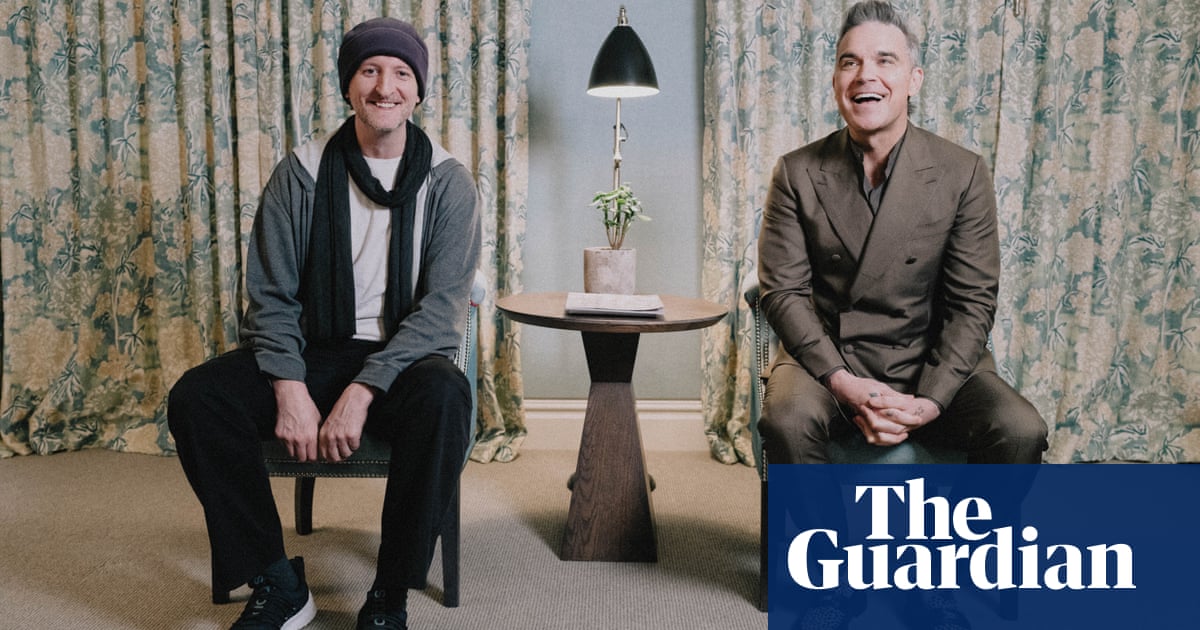â
As the conversation turns towards his relationships, Williams becomes introspective. âI have had to deal with the idea of love and relationships and being a father and being a husband,â he says. âBut also being a pop star, which is a completely different set of rules and regulations that donât really lend themselves to monogamy.â
Gracey jumps in, âYouâre a very different person to the person you were then.â
âYes,â Williams agrees. âI was a different person at breakfast. Iâm a different person now. Thatâs the thing about me, I donât really know who I am.â
But itâs not all doom and gloom in Better Man; the film is punctuated with Williamsâs hits, from Angels to Let Me Entertain You, all performed brilliantly by the actor playing Williams, with some help from the man himself. âI enjoyed teaching the actor how to be me,â Williams says. âBut also teaching him how to be a monkey.â
Gracey adds, âHonestly, the dancing was the hardest part.â
As the interview winds down, I ask Williams what he hopes audiences take away from Better Man. âI hope they see a life lived to the fullest and a man who is still trying to figure it out,â he says. âI hope they see the joy, the sadness, the laughter, the tears, the monkey.â
And with that, Robbie Williams, the eternal showman, gets up and leaves the room, a whirlwind of energy and charisma, leaving behind a lingering sense of wonder and a faint echo of his infectious laughter.
Williams has long been the subject of speculation about his sexuality, with rumors swirling throughout his career. In Better Man, this topic is touched upon in a playful manner. Williams himself has addressed these rumors in the past, once famously stating, “Honestly, you’ve never met somebody that wants to be gay as much as me.”
However, Williams has also been open about his struggles with his mental health and the impact of the intense pressure and scrutiny he faced during his time in the spotlight. The film delves into his battles with depression and the challenges he faced within the music industry.
Throughout the interview, Williams reflects on his past and the complexities of his relationships with his former bandmates and managers. He acknowledges his own faults and mistakes, while also expressing a desire for change and growth within the music industry to better support the mental health of young artists.
Overall, the interview provides a candid and introspective look at Williams’s life and career, highlighting the highs and lows of fame and the importance of self-reflection and growth. En 2004, un periódico sensacionalista publicó una entrevista con el supuesto “amante secreto gay” de Williams, sugiriendo que Williams estaba engañando al público al afirmar tener relaciones sexuales con mujeres para encubrir sus “encuentros homosexuales sórdidos con desconocidos”. Demandó al periódico un año después por difamación y ganó una indemnización sustancial y una disculpa.
“¿Qué pasa? ¿Eres heterosexual o gay?” pregunta. Le digo que soy gay. “Bien, te haré esta pregunta: hay una portada de un periódico que es leída por millones y una mujer ha dicho que le has practicado sexo oral en un canal. ¿Tú, como persona gay, demandarías al periódico?” Le digo que no demandaría, pero estaría molesto porque no es verdad. “Estaba molesto”, dice. “Estaba más triste. No por las acusaciones de ser gay, porque mira, he hecho de todo menos chupar una polla. Sinceramente, nunca has conocido a alguien que quiera ser gay tanto como yo”. Luego disipa cualquier rumor restante con una analogía futbolística. “Soy fanático del Port Vale y es como si alguien dijera ‘bueno, eres fanático del Liverpool'”, dice volteándose hacia Gracey. “Y yo digo ‘no, no soy fanático del Liverpool’. Cuando alguien te dice que eres fanático del Liverpool cien veces es como ‘¡no soy un jodido fanático del Liverpool, ¿por qué la gente piensa que soy fanático del Liverpool?!'”.
Más tarde, mirando genuinamente preocupado, vuelve a sacar el tema. “Quieres ser un aliado al mismo tiempo que proteges tu propia autenticidad y tu propia vida”, dice. “Además, si quiero chupar una polla, chuparé una polla. ¿Quién va a detenerme? ¿Mi esposa? ¡La barba!”
Williams ha pasado dos libros (Feel de 2004 y Reveal de 2017), la serie documental de Netflix de cuatro partes del año pasado y una buena cantidad de terapia reflexionando sobre la interacción entre su vida y la fama. Desde que se casó con Field en 2010 y comenzó una familia, la forma en que se acerca ha cambiado. “Ahora digo ‘papá va a trabajar'”, dice. “No era un trabajo antes. Se suponía que era mágico y cuando llegué a la cima de la montaña todo lo que había era una crisis existencial. Pero desde que [Theodora] llegó, he madurado, y uno de los grandes [cambios] es, es un trabajo”.
Ha dejado de “intentar ser Liam Gallagher” y se siente cómodo siendo “más como Val Doonican”. Un mono actuante, seguro, pero uno genial. Tampoco le importa si llamarlo un trabajo hace que parezca un poco poco romántico, o no muy rock and roll. “La gente dice ‘cómo te atreves a llamarlo trabajo, todo lo que haces es X, Y y Z’, pero solo porque tu trabajo es una mierda no significa que mi trabajo tenga que ser una mierda”.
Sonríe con una gran, gloriosamente obnoxious sonrisa a lo Robbie Williams. “Este es mi trabajo, ¡y me encanta”.
“Better Man” se lanzará en el Reino Unido el 26 de diciembre. La banda sonora se lanzará digitalmente el 27 de diciembre. Robbie Williams hará una gira por el Reino Unido, Irlanda y Europa el próximo verano.
